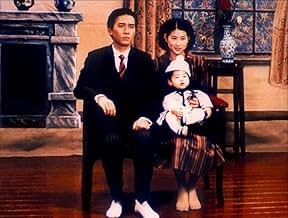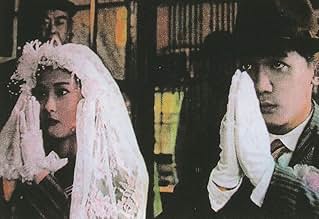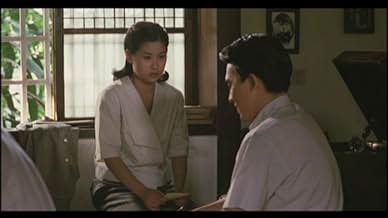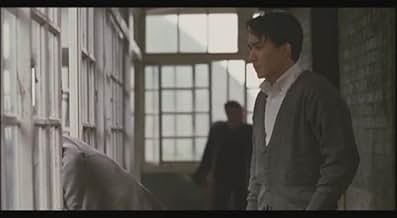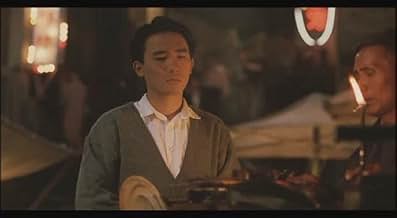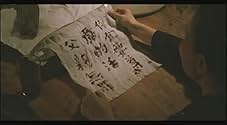Bei qing cheng shi
- 1989
- 2h 37min
CALIFICACIÓN DE IMDb
7.8/10
6.6 k
TU CALIFICACIÓN
La historia de una familia envuelta en el «Terror Blanco» que el gobierno del Kuomintang infligió al pueblo taiwanés tras su llegada de la China continental a finales de la década de 1940.La historia de una familia envuelta en el «Terror Blanco» que el gobierno del Kuomintang infligió al pueblo taiwanés tras su llegada de la China continental a finales de la década de 1940.La historia de una familia envuelta en el «Terror Blanco» que el gobierno del Kuomintang infligió al pueblo taiwanés tras su llegada de la China continental a finales de la década de 1940.
- Dirección
- Guionistas
- Elenco
- Premios
- 8 premios ganados y 6 nominaciones en total
Tony Leung Chiu-wai
- Wen-ching
- (as Tony Chiu Wai Leung)
Tien-Lu Li
- Ah-lu
- (as Tian-Lu Li)
Opiniones destacadas
10kmevy
This film is definitely one of the best historical film i have ever seen!
... putting aside all those clichés most filmmakers are tend to use: there is no such thing as heroic portrayal of martyrs or the use of extremely artificial dramatic art. That makes this film believable and, compared to others, very unique.
Normally you would have a narrator who is telling you the story from his point of view. Now, i don't want to say that i dismiss this way of narration but "A city of sadness" does not need such a narrator; in fact it would shatter the special specific atmosphere of this movie if that would be the case. Without definitive narrative elements, the staging normally involves (narration/music/DP etc), the viewer gets the feeling that he is able to see for himself what the lives of those people were like when WWII ended. It is fascinating to witness how this very sober staging is still able to evoke strong emotions within the viewer. This is due to the directors vision but also to the cast which did an amazing job.
It was also very clever to have the deaf Wen-Ch'ing as the main character so the viewer can sympathize with him very easily: like Wen-Ch'ing the viewer is kind of caught up within the political turbulence and is not to able react like he would want because he is mute ... and is therefore not able to speak up in a loud voice to stop the violence. He is forced to watch.
Even today the topic Taiwan/China isn't solved at all. After watching this film people will surely get a better understanding why the struggle between China and Taiwan is so filled with anger, sadness, fury ...
so ... that's definitely a must-see!! ;)
... putting aside all those clichés most filmmakers are tend to use: there is no such thing as heroic portrayal of martyrs or the use of extremely artificial dramatic art. That makes this film believable and, compared to others, very unique.
Normally you would have a narrator who is telling you the story from his point of view. Now, i don't want to say that i dismiss this way of narration but "A city of sadness" does not need such a narrator; in fact it would shatter the special specific atmosphere of this movie if that would be the case. Without definitive narrative elements, the staging normally involves (narration/music/DP etc), the viewer gets the feeling that he is able to see for himself what the lives of those people were like when WWII ended. It is fascinating to witness how this very sober staging is still able to evoke strong emotions within the viewer. This is due to the directors vision but also to the cast which did an amazing job.
It was also very clever to have the deaf Wen-Ch'ing as the main character so the viewer can sympathize with him very easily: like Wen-Ch'ing the viewer is kind of caught up within the political turbulence and is not to able react like he would want because he is mute ... and is therefore not able to speak up in a loud voice to stop the violence. He is forced to watch.
Even today the topic Taiwan/China isn't solved at all. After watching this film people will surely get a better understanding why the struggle between China and Taiwan is so filled with anger, sadness, fury ...
so ... that's definitely a must-see!! ;)
A previous poster described this film as a Taiwanese Godfather, but better. Indeed, this film has a lot similarities to godfather, in which the most notable is the condensation of an entire nation into the life of one single family. Even though I never really come to love other Hou's films, City of Sadness is a flawless epic that truthfully depict an era that is forgotten by most of my generation. I have heard those stories from my paternal grandparents, who are like people portrait in the film, grass root Taiwanese. I have also heard stories from my maternal grandparents, who are the late comers from mainland China. The entire different perspectives surprised me that in such a small nation, mistrust is still profoundly rooted and transmitted via generations. City of Sadness portraits this image so hauntingly and yet with beautiful and quiet transcendence seeing the turmoil through the eyes of the deaf and mute son of the Lin family. Taiwan, the city of sadness, is eternally sorrowful because of its rootlessness, which until today, still runs in my blood.
10cd1793
Needless to comment on Hou's excellent artistic directing, the story itself tightly revolves around an average Taiwanese family's life during the years 1945-1949 when Japanese occupation ended and KuoMinTang from mainland took over. There are conflict on personal/family level between native Taiwanese (BenShengRen) and mainland newcomers(WaiShengRen), and massive political prosecution and massacre of native intellectuals by KuoMinTang. Hou painted an inspiring (rather than sad) picture of the native intellectuals giving their lives to earn their fellow Taiwanese dignity which was ironically more lacking during the KuoMinTang ruling than Japanese ruling.
A movie beyond its cinematic presence, but matters also the director's outlook and the audience's interpretation - in plain words, you would give it a much higher rating if someone explains you it's historical context. Surprisingly, I find Tony Leung's performance in this film decent and slightly bland, maybe because his other works are simply too good, or maybe the performance of this movie across the board is all too flawless. As the eldest son myself, I specifically appreciated the character Wen-heung, a boisterous, truculent, and rugged man, yet also interestingly a child carer, a family adhesive, and a natural leader, whose unconstrained aggression engenders one's own tragedy. Regarding the movie itself, non-linear editing, picturesque sceneries, and long, still frames generate versatile atmospheres with a unique artistry. Also a historic fiction, the film gradually unravels an era of generational trauma using convoluted storylines and symbolic characters. In times of turmoil, perhaps it would be better if we are as deaf as Wen-ching or as bewildered as Wen-leung, like yielding grass that lives through scything gales. Definitely one of the most important chinese cinematic tribute worthy of deep-dive analyses and global recognition.
10darii73
Simply one of the best films ever made and certainly the best to have come out of China, Taiwan or Hong Kong. Forget about traumatic Taiwanese history, forget about other "epic" films from mainland China, or Taiwan, or Hong Kong. This one is one of the most profound statements about human condition and the relentless power of history. You can physically feel the winds of history blowing through a small hospital in the mountains, or a house of the person who will succumb to the inevitable, or a railway car caught in the middle of a massacre. Hou Hsiao-Hsien doesn't reconstruct history, he shows you human beings caught unawares and unable to cope with a totally unexpected avalanche of events destined to change their lives. Acting is superb, the mute character played by Tony Leung Chiu Wai (who, quite prosaically, couldn't speak Hokkien and had to be made mute) will haunt you for a very long time. One of the most underrated films from one of the most underrated directors. Spend two and a half hours of your life watching this, it's worth it. 10 out of 10.
¿Sabías que…?
- TriviaIn 1989, Hou Hsiao-hsien's A City of Sadness, the first film to touch on the 228 Incident, a taboo subject in Taiwan, became a big hit in the theaters. As a result Jioufen, where the film was set, revived due to the film's popularity. The nostalgic scenery of Jioufen as seen in the film, as well as appearances in other media, charmed many people into visiting Jioufen. For the beginning of the 90s, Jioufen experienced a tourist boom that has shaped the town as a tourist attraction. Soon retro-Chinese style cafés, tea houses, and souvenir stores bearing the name "City of Sadness" were built.
- ConexionesFeatured in When Cinema Reflects the Times: Hou Hsiao-Hsien and Edward Yang (1993)
Selecciones populares
Inicia sesión para calificar y agrega a la lista de videos para obtener recomendaciones personalizadas
- How long is A City of Sadness?Con tecnología de Alexa
Detalles
Taquilla
- Total a nivel mundial
- USD 143,169
Contribuir a esta página
Sugiere una edición o agrega el contenido que falta

Principales brechas de datos
What is the Spanish language plot outline for Bei qing cheng shi (1989)?
Responda
